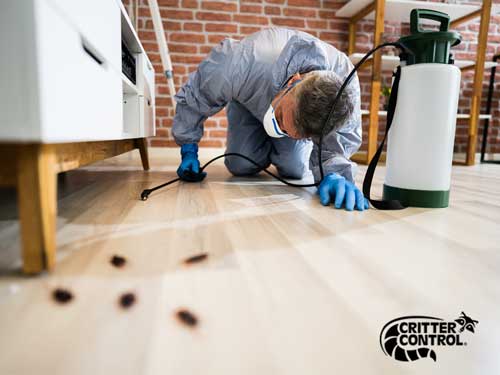Bed Insect Therapy Break Down: Contrasting Chemical Vs. Non-Chemical Solutions
In the realm of bug control, specifically when handling the consistent concern of bed bugs, the option between chemical and non-chemical therapy services can be an essential one. Both approaches provide unique advantages and disadvantages, affecting variables such as effectiveness, safety factors to consider, and total price. By analyzing the nuanced details of each technique, a clearer understanding of which course to seek in resolving a bed bug problem can be acquired.
Performance of Chemical Therapies
Chemical treatments for bed bug problems have actually been commonly identified for their potent and quick efficacy in removing these bugs. When considering the effectiveness of chemical therapies, it is important to understand that they can provide a detailed and quick service to a bed insect issue.
Moreover, chemical therapies have the benefit of using recurring effects, indicating that they can remain to get rid of bed insects also after the preliminary application. This residual activity is particularly advantageous in combating any type of potential re-infestations. In addition, the quick action of chemical treatments can bring relief to individuals encountering serious bed bug invasions, allowing them to gain back control of their home rapidly.
Security Problems With Chemical Solutions
One critical aspect that calls for careful factor to consider when using chemical options for bed bug therapy is guaranteeing the safety and security of occupants and the atmosphere. While chemical therapies can be efficient in removing bed pests, they might present risks if not managed effectively. Among the main safety worry about chemical services is the potential damage they can cause to human wellness. Exposure to certain chemicals used in bed bug therapies can bring about respiratory issues, skin irritability, or various other damaging reactions, specifically in people with pre-existing conditions or sensitivities. In addition, inappropriate application or dose of chemical pesticides can result in harmful deposits remaining in the treated location, posing long-term health threats to occupants.
Moreover, the environmental impact of chemical services is one more significant factor to consider. Some pesticides made use of in bed bug therapies may be hazardous to advantageous bugs, wildlife, and communities if they seep right into the soil or water systems. It is important to use chemical treatments sensibly, complying with safety and security guidelines, and thinking about much less toxic options to alleviate these threats and guarantee the risk-free and reliable administration of bed pest problems.
Benefits of Non-Chemical Approaches
Thinking about the possible safety and security worries and ecological influence related to chemical remedies for bed pest therapy, exploring non-chemical approaches presents an appealing option with a number of unique benefits. Non-chemical techniques offer a more secure alternative for houses, specifically those with individuals, pet dogs, or youngsters conscious rough chemicals. These techniques get rid of the dangers of exposure to harmful substances, reducing the possibility for negative health and wellness impacts. Moreover, non-chemical treatments are environmentally pleasant, as they do not add to air or water contamination, making them a sustainable selection for bug control.
Furthermore, non-chemical options can be reliable in targeting bed bugs, including hard-to-reach areas where chemical treatments might not pass through - A1 bed bug exterminator charlotte. Methods such as warmth therapy, vacuuming, vapor cleansing, and cushion encasements supply complete elimination without the usage of unsafe chemicals.
Limitations of Non-Chemical Treatments

Additionally, non-chemical treatments usually require several applications to achieve successful elimination. This can be taxing and might not always assure have a peek here complete elimination of all bed insects and their eggs, specifically in covert or hard-to-reach areas.
Additionally, the success of non-chemical treatments heavily counts on appropriate execution and thoroughness, which can be challenging for individuals without professional experience. Inadequate application of non-chemical techniques might cause insufficient obliteration, leading to persistent invasions and the requirement for extra treatments.
As a result, while non-chemical therapies have their benefits, it is necessary to acknowledge these limitations and consider them when determining the most effective method for managing bed bug infestations.
Cost Contrast: Chemical Vs. Non-Chemical Options
Given the restrictions connected with non-chemical treatments, a vital element to examine in the context of bed bug management is the price contrast in between chemical and non-chemical alternatives. Chemical treatments usually involve the application of pesticides by specialists, which can vary from $250 to $900 per space, depending upon the seriousness of the problem and the dimension of the area to be treated. In contrast, non-chemical therapies like warm treatment or vapor click reference can be much more pricey, with prices varying from $1,000 to $6,000 for an entire home. While the first expense of chemical treatments might seem lower, numerous therapies may be required to completely eliminate the problem, possibly boosting the overall price. On the other hand, non-chemical alternatives may give a much more green and sustainable remedy, although they can be cost-prohibitive for some individuals. Inevitably, when thinking about the price of bed insect treatment alternatives, it is essential to weigh the in advance expenditures against the effectiveness and long-lasting sustainability of the picked method.
Verdict

Considering the prospective security problems and environmental influence associated with chemical services for bed insect therapy, discovering non-chemical methods offers an encouraging choice with several distinct advantages.Offered the limitations associated with non-chemical treatments, a crucial facet to assess in the context of bed pest monitoring is the price contrast in between chemical and non-chemical alternatives. In contrast, non-chemical treatments like heat treatment or steam can be much more costly, with expenses varying from $1,000 to $6,000 for a whole home. While the first price of chemical therapies might appear reduced, numerous therapies may be needed to completely eliminate the invasion, potentially boosting the total price.In conclusion, when comparing chemical and non-chemical bed bug treatment alternatives, it is important to consider efficiency, security, benefits, limitations, and cost.
Comments on “Experienced A1 Exterminators Charlotte NC - Quick and Reputable Solutions”